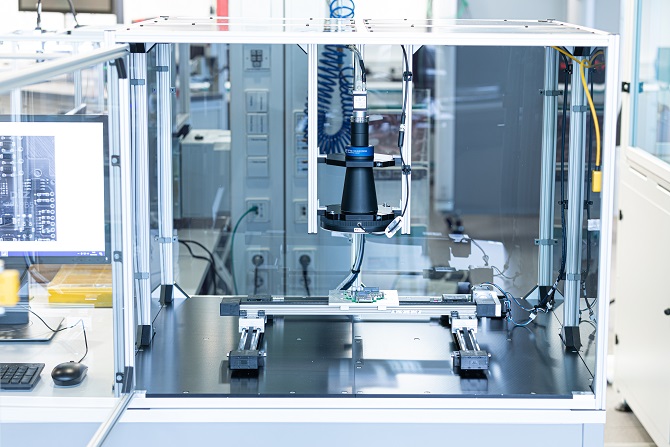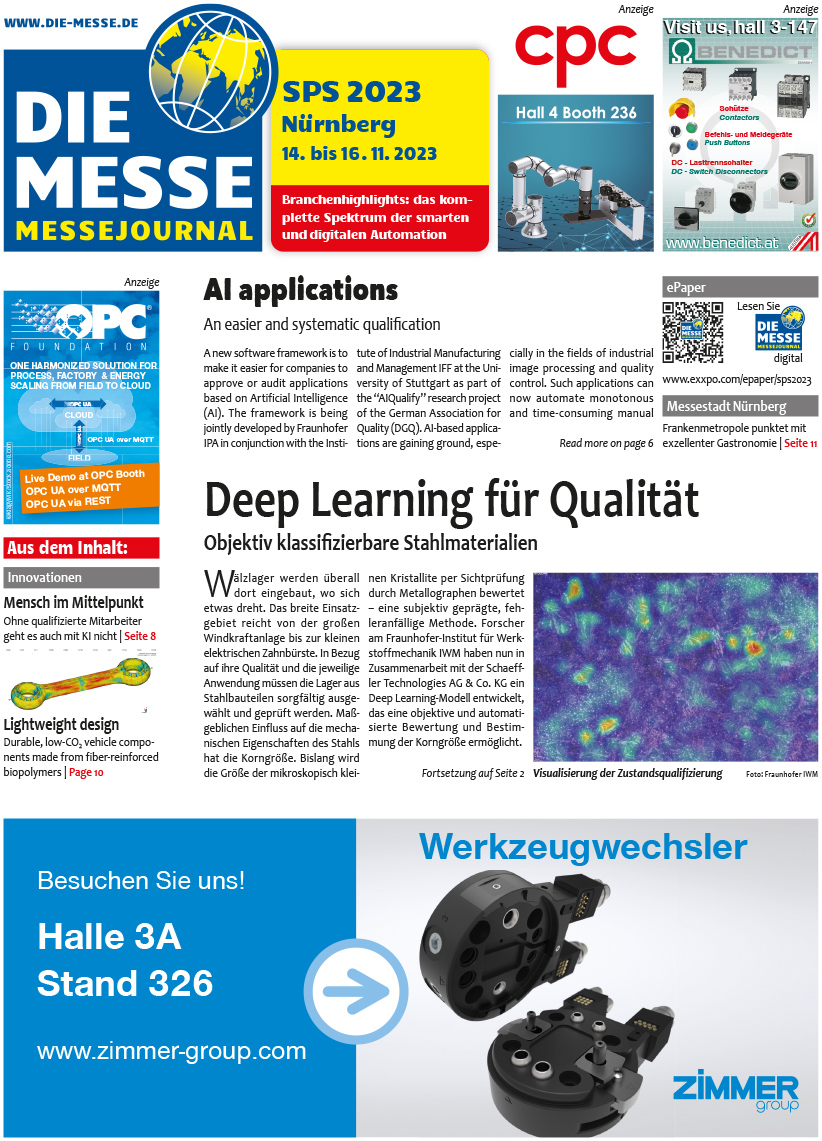14 November 2023
AI-based applications are gaining ground, especially in the fields of industrial image processing and quality control. Such applications can now automate monotonous and time-consuming manual processes very reliably and offer a significant competitive advantage, in particular to small and medium-sized enterprises (SMEs). This is especially the case when the test parts or potential defects are variable and could consequently push conventional rule-based systems to their limits.
However, a lack of transparency and understanding of how these applications actually work leads to uncertainty when it comes to deploying AI. The applications mostly rely on machine learning (ML) processes. The artificial neural networks used here learn independently from large amounts of data. However, even AI experts are rarely able to explain how exactly a result – and in a worst-case scenario, an incorrect result – is produced based on this learning process. It is precisely this situation that leads to businesses erring on the side of caution when it comes to adopting technology of this kind. In addition, legal problems could arise in the event that in future, businesses are forced to comply with additional regulations for the use of AI technologies in the context of the EU AI Act.
Simplifying and supporting AI audits
In order to remedy this and to provide greater security, especially for businesses with little experience in using AI, suitable standards and development methods are required. These would make it easier to verify the suitability or qualification of ML-based AI applications, even without the kind of specialist knowledge that has been necessary up to now.
This is precisely the goal pursued by the “AIQualify” research project with the help of an emerging software framework. A software-based assistance system supports users in defining and formulating test and evaluation criteria. These are centrally bundled in what is known as an assurance case, before being used to subsequently approve the AI application based on these criteria. The basis for this is an audit platform that provides specific audit modules for each development phase of the ML components of the AI application. A modular design is to be used for the platform, with the aim of ensuring that test modules can be easily integrated or expanded. In addition to isolated qualification, the framework can also be integrated iteratively as an element in the development process of an AI system.
Taking the entire development process into consideration
Prof. Marco Huber, who heads up the project, underlines the innovative nature of the resultant approach: “Rather than only taking the finished application into account, we go back much further – right to the very beginning, in fact. Each development phase for an AI application requires decisions that can all influence the result. For this reason, we also make sure to include aspects such as data selection, pre-processing, quality criteria and model selection.”
The software framework therefore enables three types of qualification:
This produces three distinct target groups: First, service providers for ML based quality control and management, second, manufacturing companies and, third, service providers for conformity testing and auditing. In particular, small and medium-sized enterprises (SMEs) will have the capability of qualifying third-party AI systems. In this way, the aim is for such businesses to be able to evaluate the performance of an AI system even without having their own AI specialists at their disposal.
Evaluating the framework by way of typical applications
Two use cases serve the purpose of testing the software framework in practical terms. The first use case relates to the research context of the project partners, where AI is used for camera-based detection of defective perforated discs. What is so special about this is that, in addition to real camera images, synthetic images of defects can also be created and used. This allows different degrees of severity of the test task to be taken into consideration when it comes to assessing the suitability of the ML components. The second use case comes directly from industrial practice. In addition to supporting the project as a whole, a project committee comprising manufacturing companies, among other organizations, will contribute this use case to the project.
AI applications
A new software framework is to make it easier for companies to approve or audit applications based on Artificial Intelligence (AI). The framework is being jointly developed by Fraunhofer IPA in conjunction with the Institute of Industrial Manufacturing and Management IFF at the University of Stuttgart as part of the “AIQualify” research project of the German Association for Quality (DGQ).
 Foto: Fraunhofer IPA/Photo: Rainer Bez Foto: Fraunhofer IPA/Photo: Rainer BezThe “AIQualify” project aims to develop a software framework that supports companies in their efforts to audit AI systems as part of industrial quality control processes |
However, a lack of transparency and understanding of how these applications actually work leads to uncertainty when it comes to deploying AI. The applications mostly rely on machine learning (ML) processes. The artificial neural networks used here learn independently from large amounts of data. However, even AI experts are rarely able to explain how exactly a result – and in a worst-case scenario, an incorrect result – is produced based on this learning process. It is precisely this situation that leads to businesses erring on the side of caution when it comes to adopting technology of this kind. In addition, legal problems could arise in the event that in future, businesses are forced to comply with additional regulations for the use of AI technologies in the context of the EU AI Act.
Simplifying and supporting AI audits
In order to remedy this and to provide greater security, especially for businesses with little experience in using AI, suitable standards and development methods are required. These would make it easier to verify the suitability or qualification of ML-based AI applications, even without the kind of specialist knowledge that has been necessary up to now.
This is precisely the goal pursued by the “AIQualify” research project with the help of an emerging software framework. A software-based assistance system supports users in defining and formulating test and evaluation criteria. These are centrally bundled in what is known as an assurance case, before being used to subsequently approve the AI application based on these criteria. The basis for this is an audit platform that provides specific audit modules for each development phase of the ML components of the AI application. A modular design is to be used for the platform, with the aim of ensuring that test modules can be easily integrated or expanded. In addition to isolated qualification, the framework can also be integrated iteratively as an element in the development process of an AI system.
Taking the entire development process into consideration
Prof. Marco Huber, who heads up the project, underlines the innovative nature of the resultant approach: “Rather than only taking the finished application into account, we go back much further – right to the very beginning, in fact. Each development phase for an AI application requires decisions that can all influence the result. For this reason, we also make sure to include aspects such as data selection, pre-processing, quality criteria and model selection.”
The software framework therefore enables three types of qualification:
- by the company itself,
- by a customer, supplier or partner, and finally
- through independent institutions.
This produces three distinct target groups: First, service providers for ML based quality control and management, second, manufacturing companies and, third, service providers for conformity testing and auditing. In particular, small and medium-sized enterprises (SMEs) will have the capability of qualifying third-party AI systems. In this way, the aim is for such businesses to be able to evaluate the performance of an AI system even without having their own AI specialists at their disposal.
Evaluating the framework by way of typical applications
Two use cases serve the purpose of testing the software framework in practical terms. The first use case relates to the research context of the project partners, where AI is used for camera-based detection of defective perforated discs. What is so special about this is that, in addition to real camera images, synthetic images of defects can also be created and used. This allows different degrees of severity of the test task to be taken into consideration when it comes to assessing the suitability of the ML components. The second use case comes directly from industrial practice. In addition to supporting the project as a whole, a project committee comprising manufacturing companies, among other organizations, will contribute this use case to the project.
More news about "SPS":
28 August 2020
Due to the ongoing travel restrictions and other fundamental changes caused by the coronavirus pandemic, Mesago Messe Frankfurt has decided to hold the SPS 2020 in an all-virtual format. (more…)24 July 2020
The Bavarian Government has approved the protection and hygiene concept for exhibitions in Bavaria signalling the go-ahead for the SPS 2020 in Nuremberg from 24 - 26 November 2020. In addition to numerous national exhibitors, many international exhibitors have also confirmed their attendance and are looking forward to the exhibition season with eager anticipation. (more…)15 April 2020
The Highlight Event of the Automation Industry – SPS Anniversary Edition
Despite the currently tense economic situation, the platform for the automation industry once again drew numerous exhibitors and trade visitors to Nuremberg at the end of 2019. Attendees were particularly impressed by the high level of innovation and the sheer number of practical solutions presented by exhibitors. (more…)29 March 2019
SPS Italia puts focus on digital transformation
On 28-30 May 2019, SPS Italia, the trade fair for smart, digital, flexible manufacturing, which has by now become a reference point for the Italian manufacturing sector, is holding its ninth annual event, taking place in Parma. (more…)21 January 2019
SPS IPC Drives Italia: Automation solutions for Italy
SPS IPC Drives Italia is the leading platform for the industrial automation and digitalisation in Italy. In its 9th consecutive year it involves all players of the supply chain: OEMs, end-users, distribution partners, system integrators, specialist press and universities. (more…)
| FAIR NAVIGATOR AUTOMATION | |
|---|---|
|
| E-PAPER SPS |
 |
